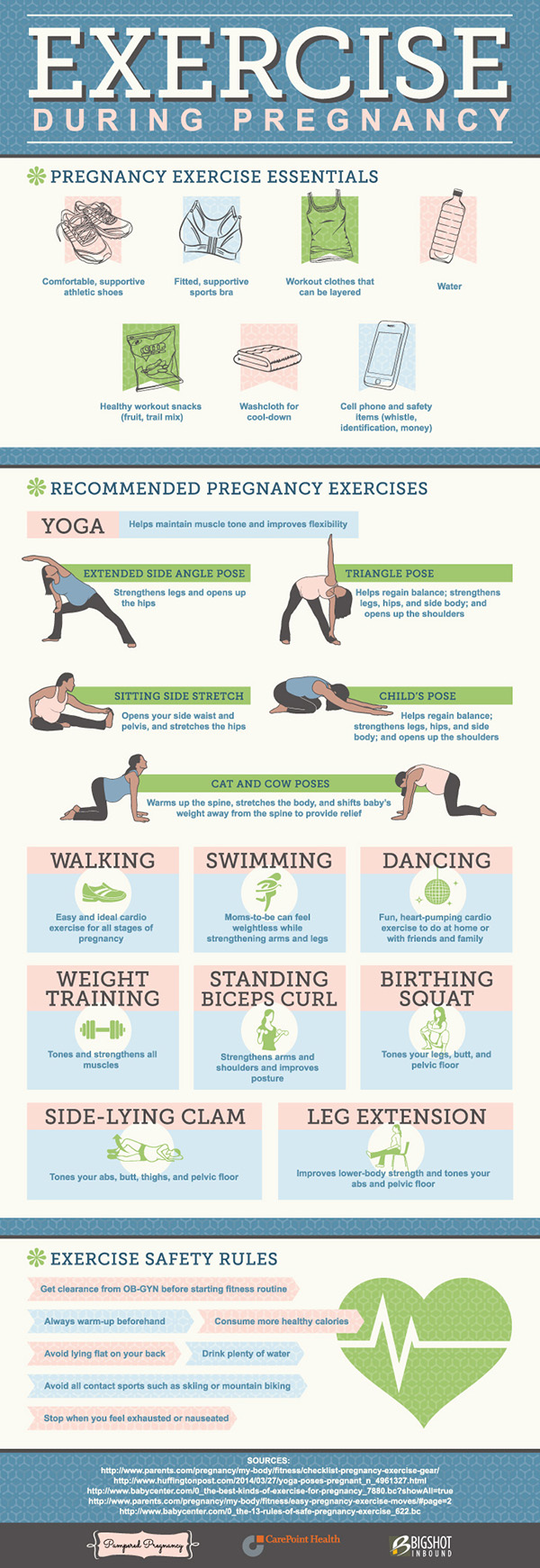Some women may view pregnancy as a time to rest and avoid over-exerting themselves as their body works to create a new life.
It is, therefore, common for women to feel that they should stop exercising during pregnancy.
In fact, researchers for a 2015 publication of the journal PLoS ONE found that only 20 percent of the 1,279 women in their study exercised throughout pregnancy.
Furthermore, half of study participants stopped exercising as a result of becoming pregnant.
While pregnancy does create changes in the body, experts still advise that pregnant women should exercise.
The American Congress of Obstetricians and Gynecologists recommends that pregnant women without medical complications engage in at least 30 minutes of moderate exercise on all or most days of the week.
If you are suffering from fatigue, aches, and pains during your pregnancy, exercise may be the last thing on your mind.
However, regular physical activity benefits both you and your growing baby.
Here, learn about several health-related reasons you should continue to exercise throughout pregnancy.
Reduced Gestational Diabetes Prevalence
Gestational diabetes, a condition in which blood sugar levels are elevated, is a complication that some pregnant women may experience.
Fortunately, regular physical activity during pregnancy can reduce your risk of developing this condition.
In 2015, researchers for Medicine & Science in Sports & Exercise found that women who exercised three times per week during pregnancy were less likely than women in a control group were to experience gestational diabetes.
Additional research has confirmed this benefit. In a 2015 review in BJOG: An International Journal of Obstetrics & Gynecology, scientists analyzed the results of 13 different studies concerned with the relationship between exercise and gestational diabetes.
They found that exercising during pregnancy reduced the risk of gestational diabetes by 31 percent.
Lower Depression Risk
Exercising during pregnancy could protect you from depression.
In a study in a 2012 edition of the Journal of Physiotherapy, pregnant women participated in either an aerobic exercise group or a control group.
After three months, women in the exercise group reduced their depressive symptoms more than women in the control group.
A 2013 study in Psychology & Health showed similar results.
Study participants who followed expert guidelines for physical activity during pregnancy experienced less depression than did those who failed to meet the guidelines.
Gestational Weight Gain and Weight Retention
Some weight gain is necessary during pregnancy, but excessive weight gain can have a negative impact on your health.
Exercise during pregnancy can help to control your gestational weight gain.
Researchers for a 2015 edition of the Maternal & Child Health Journal found that pregnant women who exercised at least three times per week were 57 percent less likely to gain an excessive amount of weight during pregnancy when compared to women who exercised less.
Not only can physical activity control gestational weight gain; it can also prevent weight retention after childbirth.
In a 2011 study in the European Journal of Contraception & Reproductive Health Care, pregnant women in an exercise group completed an hour of aerobic dancing and strength training twice weekly for 12 weeks.
Those in the exercise group were less likely than women in a control group were to exceed gestational weight gain recommendations.
Participants who completed 24 exercise sessions gained less weight during pregnancy and retained less weight after giving birth.
In fact, those who exercised at least 24 times during the study retained an average of 1.76 pounds, whereas those in the control group retained, on average, 7.26 pounds.
Pain Management
Even though exercise works your muscles, it can reduce your pain during pregnancy.
In 2012, researchers for the British Journal of Sports Medicine found that pregnant women who exercised at least three times per week were less likely to experience pelvic pain, and those who exercised one or two days per week reported less back pain.
Additional research has shown that exercise can help pregnant women to manage their pain.
In a 2005 study in the International Journal of Gynecology & Obstetrics, pregnant women who exercised three days per week during the latter half of pregnancy enjoyed a significant decrease in the severity of their back pain, whereas women in a control group suffered from more intense back pain.
Impact on Labor and Delivery
Staying active during pregnancy could make your labor and delivery process more tolerable.
In a 2015 study in the American Journal of Health Promotion, pregnant women in an exercise group completed 55-60 minutes of physical activity three days per week.
Study results showed that the first stage of labor was just over two hours shorter for women in the exercise group, compared to women in a control group.
In another study, published in a 2012 edition of Medicine & Science in Sports & Exercise, previously sedentary women completed either four aerobic workouts per week or remained sedentary, beginning at 12-14 weeks gestation and continuing through week 36.
Results indicated that women in the exercise group had fewer C-sections, and they recovered faster after childbirth.
Benefits for Baby
Physical activity during pregnancy has been shown to provide benefits to the newborn.
One such benefit is a reduction in the risk of a condition called fetal macrosomia.
According to the American Academy of Family Physicians, this condition occurs when a newborn exceeds a certain weight, typically 9 pounds, 4 ounces, and it increases the risk of clavicle fractures and nerve damage in the newborn.
Fortunately, exercise during pregnancy reduces these risks. In a 2013 study in the Croatian Medical Journal, women either exercised three times per week for the duration of their pregnancy, or they served in a control group.
Study results indicated that women in the exercise group were significantly less likely to give birth to a baby with macrosomia.
A 2014 study in Maternal & Child Health also found that women who exercised more during the first 20 weeks of pregnancy were less likely to have excessively large babies.
Exercise during pregnancy has additional benefits which extend beyond birth.
In a 2015 study in BMC Pregnancy & Childbirth, researchers found that children of mothers who engaged in mild exercise during pregnancy were 23 percent less likely to be overweight or obese at age eight compared to children of sedentary mothers.
Physical activity is also linked to improved intellectual development.
In 2014, researchers for PLoS ONE found that four-year-old children whose mothers were active during pregnancy had an IQ that was, on average, 5 points higher.
Children one year of age had higher IQ’s when their mothers were active, even after accounting for confounding factors.
Conclusion
Increased intelligence during childhood is just one of several benefits associated with exercise during pregnancy.
As the research indicates, pregnant women who remain physically active enjoy numerous perks, including a lower risk of diabetes and depression, less weight gain, and decreased pain.
With so many benefits being associated with exercise during pregnancy, it is clear that exercise is just as important during this stage of life as at any other time.
Be sure to consult with your obstetrician to develop a safe exercise routine that meets the needs of both you and your growing baby.
Author’s Note:
Get our products now from our archive at surukang.com for your pussy-tightening, tummy-flattening, pink lips, hips and butt enlargement, dick enlargement, etc.









